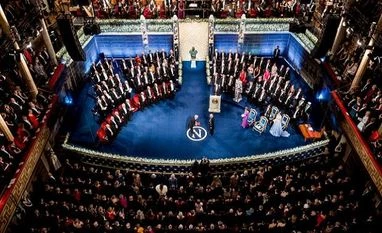While the award of the Nobel Prize for economics to someone from Kolkata, among others, elicited an outpouring of emotion throughout the country, especially in his hometown, the award of the Nobel Prize for literature, a week or so earlier, only managed to provoke bitter worldwide controversy.
To begin with, the world was witness this year to the literally unprecedented spectacle of two awards being made in the same category. This not entirely desirable precedent was occasioned by the failure of the Swedish Academy to make the award for literature last year. It was thus that the Nobel Prize for literature for 2018 and 2019 was awarded simultaneously this year.
It wasn’t benign providence that had prevented the Academy from awarding the Nobel Prize for literature last year. It had been prevented by a scandal involving sexual misconduct and financial irregularities that had engulfed the Academy last year. Not only had the Nobel for literature been suspended, but the credibility of the Academy and the prize itself had been so badly undermined that it was felt that the prize should be awarded a year later to allow the Academy to recover from the scandal.
Of the two awards made this year, the 2018 Nobel for literature went to Olga Tokarczuk, a Polish writer based in a small town in her native country. The Nobel citation mentioned “a narrative imagination that with encyclopedic passion represents the crossing of boundaries as a form of life”. The award was uncontroversial.
Not so the almost simultaneously awarded literature Nobel for this year, which went to Peter Handke, an Austrian novelist. This award sparked outrage throughout the world because of Handke’s controversial views on the Yugoslav wars of the 1990s and his proximity to Serbian leader Slobodan Milosevic, who had been charged with war crimes. Handke was himself accused of being a genocide denier.
Statements by Kosovo leaders and the influential international literary body PEN excoriated both Handke and the Academy. The Swedish Academy’s somewhat disingenuous response, given its track record, was that it made choices based on aesthetic and literary considerations and it wasn’t its job to take positions on political views.
The firestorm broke out after the award was announced. As the controversy snowballed, with many writers and others joining issue with the choice, the Academy issued a statement last week saying it had “obviously not intended to reward a war criminal and denier of war crimes or genocide. But that’s the impression you get in the media right now”. Two members of the group that evaluates nominations weighed in to defend Handke. One of them said that in 50 years Handke’s choice would appear automatic, like Samuel Beckett’s seems now.
The Nobel Prize for literature, like the Nobel Prize for peace, has been a lightning rod for controversy for a very long time. This is obviously because the evaluation of literary merit must necessarily be subjective. That this subjectivity is “owned” by a fairly large group of people is beside the point.
Further, it is untrue as is being claimed that politics is not involved in these choices. Like the Nobel Prize for peace, that for literature has had a long history of being embroiled in political choices. It is debatable whether a writer’s political opinions have prevented him or her from winning the prize, but it is far clearer that the views a writer holds has often enabled the award of the prize.
But the disingenuousness of the argument about aesthetic and literary considerations lie not so much in the question of whether, or to what extent, political considerations should intervene in the decision-making process. The question is more fundamentally about whether any such thing as pure aesthetic or literary quality exists in the first place.
Aesthetic and literary choices are determined culturally and contextually across time and space. The Nobel Prize for literature awarded in 2016 to American songwriter Bob Dylan is a case in point. There is no doubt that Dylan was one of the most, if not the most, influential songwriter ever within the broad genre of rock music. His songs helped shape the sensibilities of more than one generation of people throughout the world.
The question is whether that qualifies his oeuvre as literature. In other words, we must decide whether the lyrics of songs constitute of themselves a literary genre or whether by some alchemy they achieve the status of poetry. Views on this will, of course, vary and disagreements over the award of the literature Nobel to Dylan will for a long time arouse violent passions on both sides.
That is not the point. The point is that the context of the early 21st century permitted, in the first place, the award of the Nobel to Dylan because issues of the sort mentioned above had become legitimate themes of debate. That would not have been the case even a couple of decades ago.
The Swedish Academy’s defence of not being hostage to politics and the implied argument about pure aesthetics, thus, hardly washes. Not, at least, while Milan Kundera, still alive, remains resolutely unconsidered for the prize.
Unlock 30+ premium stories daily hand-picked by our editors, across devices on browser and app.
Pick your 5 favourite companies, get a daily email with all news updates on them.
Full access to our intuitive epaper - clip, save, share articles from any device; newspaper archives from 2006.
Preferential invites to Business Standard events.
Curated newsletters on markets, personal finance, policy & politics, start-ups, technology, and more.
)